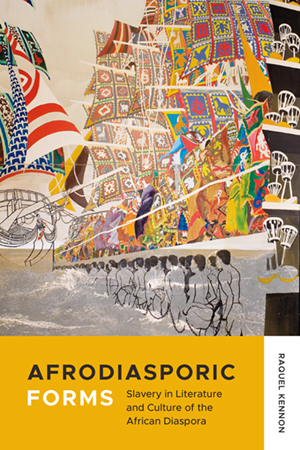
336 pages / 6.00 x 9.00 inches / 8 color photographs, 1 map
Literary Criticism / Comparative | Social Studies / African-American History | Social Science / Black Studies (Global)
Afrodiasporic Forms explores the epistemological possibilities of the “Black world” paradigm and traces a literary and cultural cartography of the monde noir and its constitutive African diasporas across multiple poetic, visual, and cultural permutations. Examining the transatlantic slave trade and modern racial slavery, Raquel Kennon challenges the US-centric focus of slavery studies and draws on a transnational, eclectic archive of materials from Lusophone, Hispanophone, and Anglophone sources in the Americas to inspect evolving, multitudinous, and disparate forms of Afrodiasporic cultural expression.
Spanning the 1830s to the twenty-first century, Afrodiasporic Forms traverses national, linguistic, and disciplinary boundaries as it investigates how cultural products of slavery’s afterlife—including poetry, prose, painting, television, sculpture, and song—shape understandings of the African diaspora. Each chapter uncovers multidirectional pathways for exploring representations of slavery, considering works such as a Brazilian telenovela based on Bernardo Guimarães’s novel A Escrava Isaura, Robert Hayden’s poem “Middle Passage,” Kara Walker’s sculpture A Subtlety, and Juan Francisco Manzano’s Autobiografía de un esclavo. Kennon’s expansive method of comparative reading across the diaspora uses eclectic pairings of canonical and popular textual and artistic sources to stretch beyond disciplinary and national borders, promoting expansive diasporic literacies.
Raquel Kennon is associate professor in the Department of Africana Studies at California State University, Northridge.
“The power of this critical study that maps the Black world is its global lens and Raquel Kennon’s command of genre. The telenovela, art, fiction, poetry, the enslavement narrative, and song, arranged to offer glimpses of Brazil, the United States, and Cuba, give us a wonderful new starting point from which to engage with the diasporic dimensions of enslavement and its memorialization in comparative contexts. The subtext of the sugar motif, which Kennon extrapolates from the historiography on the enslavement trade yet repurposes to reveal new agency, anchors her original ideas to important memories of the past. She leaves us with a new discursive path to follow, one dotted with updated critical landmarks.”
—Christel N. Temple, professor of Africana studies at the University of Pittsburgh and author of Black Cultural Mythology
Found an Error? Tell us about it.